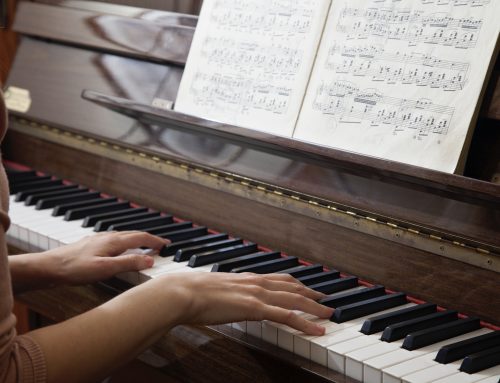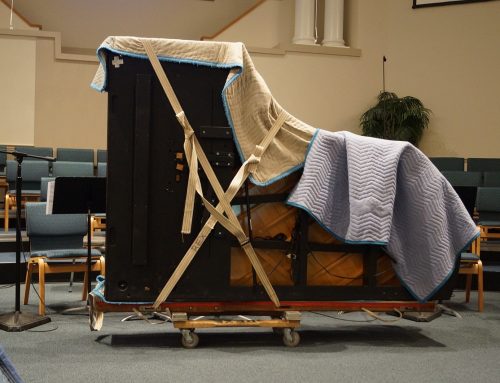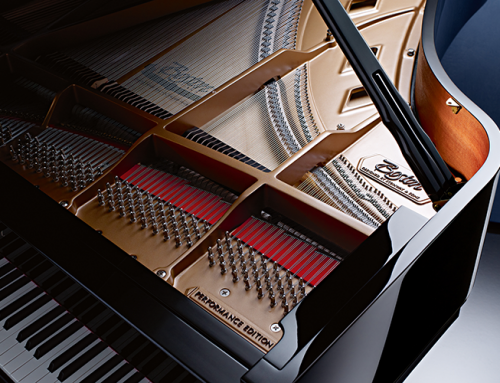This topic comes up fairly often for piano owners who are moving or need to store their pianos temporarily or even long-term. Pianos are instruments that require upkeep and maintenance from time to time. Taking care of your piano in the home is typically an easy venture.
There are many simple solutions to maintaining your piano in an even climate within your house, but what if keeping your piano in your home is no longer an option?
Perhaps you need the space for remodeling, or you need to move into a smaller home and cannot immediately accommodate your piano? Regardless of the reason for storing it, piano owners should be aware of some facts about storing a piano before making a decision on a storage facility.
Temperature Effects and Humidity
Most pianos are mostly comprised of wood. While wood is a sturdy and versatile material, it is not immune to variances in temperature changes or humidity.
 Seasonal temperature swings can cause the wood to shrink or swell, causing seams to split apart creating sizable gaps, breaking apart glued joints, causing cracks and fissures to form, and weakening the integrity of the case itself. Extreme temperature variances exacerbate this reaction and can cause severe damage to a piano in a short amount of time.
Seasonal temperature swings can cause the wood to shrink or swell, causing seams to split apart creating sizable gaps, breaking apart glued joints, causing cracks and fissures to form, and weakening the integrity of the case itself. Extreme temperature variances exacerbate this reaction and can cause severe damage to a piano in a short amount of time.
The soundboard can also be affected easily by fluctuations in humidity, causing the material to flex and put pressure on the strings, requiring re-tuning. The best way to keep a piano in tune is to maintain a consistent level of humidity.
Humidity and moisture content can also affect the metal components of a piano. Moisture build-up on these metal components can cause them to rust and weaken, affecting the sound, pitch, vibration, and longevity of the parts themselves.
Climate Control
If you’ve browsed around searching for a storage location, you may be aware that climate control storage units come at a premium price point versus other standard units. While it may be more expensive, depending on what you plan to store, it may be worth the extra coin!
Climate controlled units regulate the temperature as well as the amount of humidity of a set of storage units. This prevents temperature extremes and moisture content from affecting your belongings, for example, your piano.
The regulation of temperature and humidity can help protect your piano from the damaging elements, while keeping it more secured than a standard unit. This creates a safe harbor for your special pieces that may be susceptible to seasonal changes or moisture.
What Type of Climate Control Should I Choose?
There are actually two main options to choose when searching for climate controlled facilities. Some facilities use a type of dehumidifier called a “desiccant dehumidifier”. This employs the use of a chemical substance that aides in removing moisture content from the air. While much more cost effective, this process is not as efficient at handling high levels of humidity.
The alternative uses a mechanical dehumidifier. This utilizes a refrigerant, much like an air conditioner does to cool the air and help remove high levels of humidity more efficiently. This process is a little more costly, thus reflecting in the rental fees.
Depending on your geographical location and seasonal shifts in weather and humidity, one option may stand above the other. It’s important to research the area, and storage facility specifications before making a decision that can impact the longevity of your piano.
You should also make sure that the facility you choose clearly defines what “climate control” means for their tenants. Some facilities also offer a “no damage” guarantee for the term of your lease, while others simply offer a reasonable effort to maintain an average temperature with no guarantee.
Don’t simply settle for the cheapest. Make sure the unit you choose offers everything you need to ensure your possessions are well protected and safe from harmful weather extremes.
What Should I Do to Protect My Piano?
There are a few things you can do for your piano in order to preserve it better in storage. One of the most important things prior to storing your piano is to clean and polish it with oil. This helps to mitigate mold and moisture residue from accumulating, and helps prevent wood rot. Next, you can protect the keys by placing a cloth or sheet over them, and close the lid. This will help keep dust and airborne particulates from building up or settling on the keys.
You may also choose to create a protective barrier around the piano with soft blankets or sheets. Blankets can help prevent damage during the move, and sheets or wraps can also block dust build up and help protect the finish of the piano wood.
We always recommend trying to keep your piano in play by lending it to a friend or relative and keeping it in their home temporarily, but if circumstances do not allow for such, a climate controlled storage solution is highly advised.







Leave A Comment